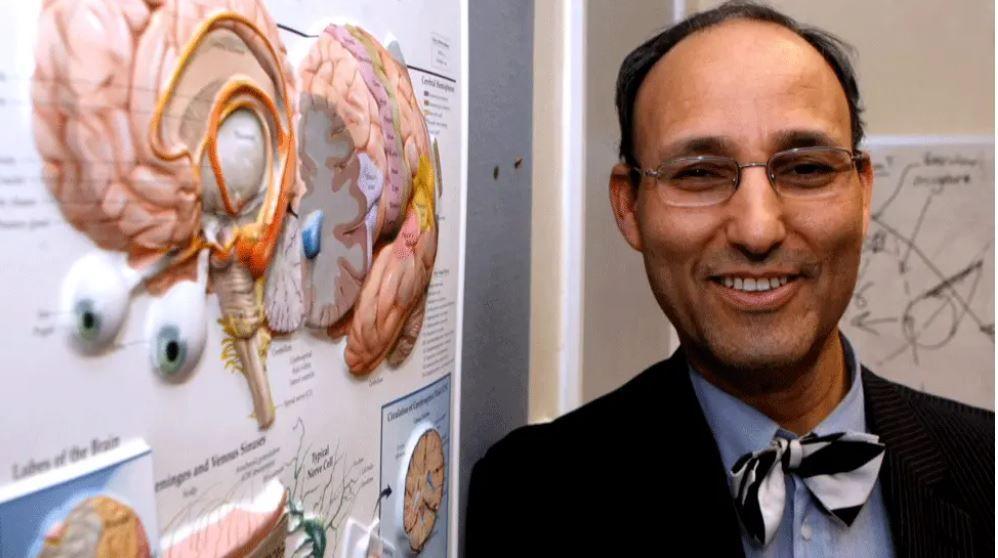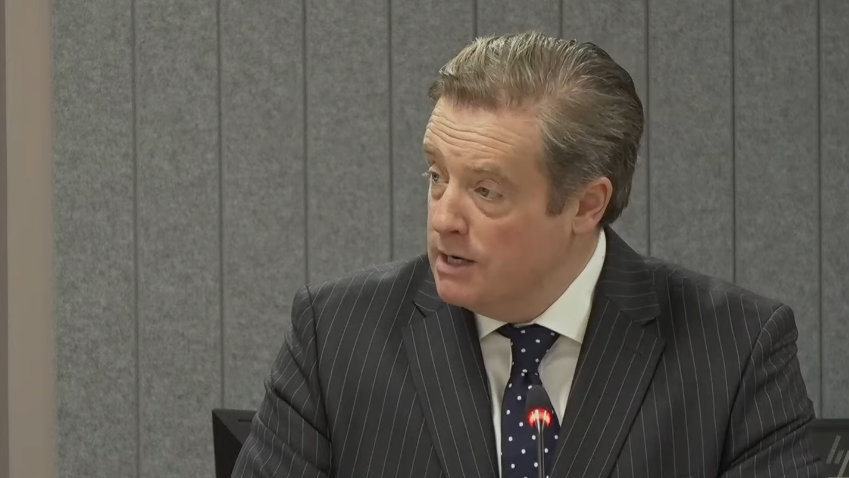Eljamel logbooks destruction 'may have broken law'

Sam Eljamel was the head of the neurosurgery department at Ninewells Hospital in Dundee
- Published
NHS Tayside may have broken the law when it destroyed 40 logbooks potentially relating to disgraced surgeon Sam Eljamel, a public inquiry has heard.
Eljamel, who was head of neurosurgery at Dundee's Ninewells Hospital until his suspension in December 2013, harmed dozens of patients and left some with life-changing injuries.
The Eljamel Inquiry, external was told previously that the health board destroyed the logbooks, which included the years Eljamel practised at the hospital, despite an order not to do so.
The inquiry's lawyer said that this could have "potentially serious consequences" under the Inquiries Act 2005, external, which includes sections relating to the altering or destruction of documents.
The inquiry was set up to investigate Eljamel's professional practice, and has been hearing opening statements from its core participants.
It was revealed on Wednesday that the hard copy theatre logbooks were destroyed in July in line with NHS Tayside's health records strategy.
The inquiry chair Lord Weir had issued a formal "do not destroy" notice to the health board in October 2024.

Jamie Dawson KC is the inquiry's senior counsel
NHS Tayside's lawyer Una Doherty KC said that some of the logbooks "may have contained" information of "potential assistance" to the inquiry.
She said that much of the information normally contained in the destroyed logbooks "should still exist in patient records, if those still exist".
Ms Doherty said the staff members who destroyed the logbooks were not aware of the connection between the theatre logs and Eljamel.
Addressing the matter on Thursday, the inquiry's senior counsel Jamie Dawson KC said that "blaming the individuals will simply not do" when those individuals were "acting in the course of their employment with the board".
He said: "Though NHS Tayside's candour in bringing this event to the inquiry's attention should be commended, I should say that the explanation provided in the materials presented to the inquiry will not suffice.
"More will be expected - if the corporate position is not sufficient, a further explanation will be sought from individuals responsible."
'Potentially serious consequences'
Mr Dawson said that patients who "harboured concerns" about their medical records would approach NHS Tayside's claim that the information in the logbooks may be found elsewhere "with a degree of scepticism".
Mr Dawson said that the destruction of the logbooks was "an admitted failure of document management, which has occurred in real time rather than historically."
He said: "The legal position is that this occurrence can have potentially serious consequences in terms of both sanction under Section 35 of the (Inquiries) Act and evidentially.
"As such I will say nothing more on the matter."
Section 35 of the Act says a person is guilty of an offence if, during the course of an inquiry, they intentionally alter or destroy a relevant document.
'Scandal of highest order'
NHS Tayside said the logbooks were destroyed "in error".
A spokesperson added: "An internal review into the circumstances surrounding the destruction of the theatre logbooks identified that these were placed in a confidential waste stream to be disposed of in error.
"The individuals involved were not aware of the connection between the logbooks and Mr Eljamel."
Scottish Conservative MSP Liz Smith raised the issue at Holyrood, where she described the health board's actions as "a scandal of the highest order".
She called on the government to reveal when it found out that the logbooks had been destroyed and what action it was taking.
Health Secretary Neil Gray said that, due to inquiry confidentiality, the government knew nothing about the situation until the information came into the public domain on Wednesday.
The minister said he was "appalled" by what had happened and that he had ordered NHS Tayside to give him an immediate explanation as to why it did not inform the government at the time.
Theatre logbooks of disgraced surgeon destroyed by NHS staff
- Published1 day ago
NHS Tayside sorry for 'adding to Eljamel trauma'
- Published10 September
The inquiry also heard that almost 500 former patients of Eljamel have applied to have their cases reviewed.
The inquiry was told that a separate independent clinical review into the surgeon had received 474 registrations from patients or their representatives, with 354 consent forms completed.
The clinical review will give Eljamel's patients the opportunity to have a personalised review of their care.
Information from the reviews may be shared with the public inquiry, with the patients' consent.
The inquiry will begin its first section of evidence gathering in April, with patients' evidence set to begin next September.
Disclosure: Harmed by my surgeon
Lucy Adams reports on the NHS Tayside surgeon accused of harming dozens of his patients